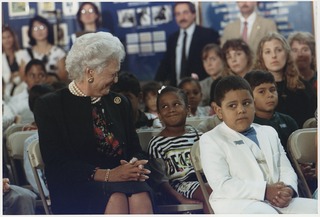
Phonics is a method for teaching reading and writing to beginners. To use phonics is to teach the relationship between the sounds of the spoken language (phonemes),and the letters (graphemes) or groups of letters or syllables of the written language. Phonics is also known as the alphabetic principle or the alphabetic code. It can be used with any writing system that is alphabetic,such as that of English,Russian,and most other languages. Phonics is also sometimes used as part of the process of teaching Chinese people to read and write Chinese characters,which are not alphabetic,using pinyin,which is alphabetic.
Reading comprehension is the ability to process written text,understand its meaning,and to integrate with what the reader already knows. Reading comprehension relies on two abilities that are connected to each other:word reading and language comprehension. Comprehension specifically is a "creative,multifaceted process" that is dependent upon four language skills:phonology,syntax,semantics,and pragmatics. Reading comprehension is a part of literacy.

The National Assessment of Educational Progress (NAEP) is the largest continuing and nationally representative assessment of what U.S. students know and can do in various subjects. NAEP is a congressionally mandated project administered by the National Center for Education Statistics (NCES),within the Institute of Education Sciences (IES) of the United States Department of Education. The first national administration of NAEP occurred in 1969. The National Assessment Governing Board (NAGB) is an independent,bipartisan board that sets policy for NAEP and is responsible for developing the framework and test specifications.The National Assessment Governing Board,whose members are appointed by the U.S. Secretary of Education,includes governors,state legislators,local and state school officials,educators,business representatives,and members of the general public. Congress created the 26-member Governing Board in 1988.
Kenneth Goodman was Professor Emeritus,Language Reading and Culture,at the University of Arizona. He is best known for developing the theory underlying the literacy philosophy of whole language.
Reciprocal teaching is a powerful instructional method designed to foster reading comprehension through collaborative dialogue between educators and students. Rooted in the work of Annemarie Palincsar,this approach aims to empower students with specific reading strategies,such as Questioning,Clarifying,Summarizing,and Predicting,to actively construct meaning from text.

The most recent comprehensive data on adult literacy in the United States come from the Program for the International Assessment of Adult Competencies (PIAAC) study conducted in stages from 2012 to 2017 by the National Center for Education Statistics (NCES). English literacy test results from 2014 suggest that 21% of U.S. adults ages 16 to 65 score at or below PIAAC literacy level 1,meaning they have difficulty "[completing] tasks that require comparing and contrasting information,paraphrasing,or making low-level inferences." Included in that 21% is the 4.2% of respondents who were unable to be assessed due to language barriers,cognitive disability,or physical disability. A 2020 study by the Gallup analysis company funded by the Barbara Bush Foundation for Family Literacy estimated that getting all U.S. adults to at least PIAAC literacy level 3 proficiency would raise American's incomes by $2.2 trillion.

Reading is the process of taking in the sense or meaning of symbols,often specifically those of a written language,by means of sight or touch.
Nell K. Duke is a contemporary educator and literacy researcher with an interest in informational text,early literacy development,and reading comprehension instruction,with an emphasis on children living in poverty. She is currently a professor of language,literacy,and culture and a faculty associate in the combined program in education and psychology at the University of Michigan.
Elfrieda "Freddy" Hiebert is an educational researcher whose work examines literacy,learning,early childhood development,teacher development,writing and children's literature. The main thrust of her work addresses literacy learning among at-risk youth in American classrooms. Currently,she is the CEO and president of TextProject,Inc.,an agency that is dedicated to bringing beginning and struggling readers to high levels of literacy through a variety of strategies and tools,particularly through using science and social studies texts,used for reading instruction.
Marcia Invernizzi is an American professor,author,and researcher in the field of Reading Education. At the University of Virginia School of Education and Human Development,she teaches reading education. As founder of the Book Buddies program,she is known as a leader in early literacy intervention.

Douglas K. Hartman is an American scholar in the field of education. He is a professor of technology &human learning in the College of Education at Michigan State University. He has a joint appointment in the Departments of Educational Psychology &Educational Technology and Teacher Education. His research focuses on the use of digital technologies for human learning in a number of domains.
John T. Guthrie is a researcher and scholar in the area of student motivation as it relates to literacy.
Concept-Oriented Reading Instruction (CORI) was developed in 1993 by Dr. John T. Guthrie with a team of elementary teachers and graduate students. The project designed and implemented a framework of conceptually oriented reading instruction to improve students' amount and breadth of reading,intrinsic motivations for reading,and strategies of search and comprehension. The framework emphasized five phases of reading instruction in a content domain:observing and personalizing,searching and retrieving,comprehending and integrating,communicating to others,and interacting with peers to construct meaning. CORI instruction was contrasted to experience-based teaching and strategy instruction in terms of its support for motivational and cognitive development.
Robert J. Tierney is the Dean Emeritus of Education,University of British Columbia and Professor Emeritus of Language and Literacy Education. He previously held an the position of Dean of Education and Social Work and is currently Honorary Professorship at University of Sydney. He is also a published author of articles and books. His research focuses on cognitive processes,reading comprehension,reading-writing relationships,assessment,digital literacy,and global developments in education.
Patricia A. Edwards,a member of the Reading Hall of Fame,is a Distinguished Professor of Language and Literacy in the Department of Teacher Education and a Senior University Outreach Fellow at Michigan State University. She is a nationally and internationally recognized expert in parent involvement,home-school-community partnerships,and multicultural,early,and family/intergenerational literacy with a focus on poor and minority children. She served on the International Literacy Association Board of Directors from 1998–2001,as the first African American President of the Literacy Research Association from 2006–2007,and as President of the International Literacy Association from 2010–2011. Edwards also served as a member of the Board of Directors for the American Educational Research Association's (AERA) Family,School,and Community Partnerships Special Interest Group (SIG) from 2014–2016 and was elected to serve as its President-Elect/President from 2016–2020.
Lynn Fuchs is an educational psychologist known for research on instructional practice and assessment,reading disabilities,and mathematics disabilities. She is the Dunn Family Chair in Psychoeducational Assessment in the Department of Special Education at Vanderbilt University.
The simple view of reading is that reading is the product of decoding and language comprehension.

Timothy Shanahan is an educator,researcher,and education policy-maker focused on literacy education. He is Distinguished Professor Emeritus in Education,at the University of Illinois at Chicago,College of Education,Department of Curriculum &Instruction,and he has held a visiting research appointment at Queens University,Belfast,Northern Ireland. He was elected president of the International Literacy Association in 2004. He operates the popular informational website,Shanahan on Literacy. He was recently recognized as one of the top 2% of scientists in the world,according to a recent study published by Stanford University scholars.
Annemarie Sullivan Palincsar is a scholar of education known for her research on literacy instruction,reciprocal teaching,and cognitive apprenticeships. Her involvement in the National Academies of Sciences,Engineering,and Medicine Research Council on the Prevention of Reading Difficulty in Young Children,the National Research Council's Panel on Teacher Preparation,and the International Literacy Association's Literacy Research Panel,attests to her dedication to advancing educational research and improving teacher training. Palincsar is the Ann L. Brown Distinguished University Professor Emerita at the Marsal Family School of Education at the University of Michigan.
Gale M. Sinatra is an American educational psychologist known for her leadership and research on climate science education,education psychology,and enhancing the public's interest of science. She was instrumental in developing the conceptual change learning model. Sinatra is a distinguished professor of Psychology and the Stephen H. Crocker Chair of Education at the University of Southern California (USC). She is the Chair of the American Psychological Association (APA) Climate Change Task Force and previously served as the President and Editor of APA's Division 15 journal,Educational Psychology. In 2022,Sinatra was awarded the Membership in the National Academy of Education,an award for researchers who have advanced policy and practice in their research.





